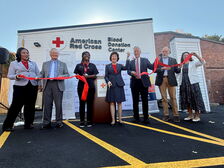Processing Your Payment
Please do not leave this page until complete. This can take a few moments.
- News
-
Editions
View Digital Editions
Biweekly Issues
- December 1, 2025
- Nov. 17, 2025
- November 03, 2025
- October 20, 2025
- October 6, 2025
- September 22, 2025
- + More
Special Editions
- Lists
- Viewpoints
-
Our Events
Event Info
Award Honorees
- Calendar
- Biz Marketplace
Maine efforts targeting homelessness, domestic violence get $20 million in federal funding
Fifteen organizations and state agencies in Maine have been awarded a total of $20.8 million to support housing assistance for homeless individuals and families, as well as those fleeing domestic violence, sexual assault and stalking.
The money was provided through the U.S. Department of Housing and Urban Development’s Continuum of Care Program.
U.S. Sen. Susan Collins, R-Maine, vice chair of the Senate Appropriations Committee, said the investments “will address the urgent needs of vulnerable populations in Maine, helping to ensure our neighbors have access to the necessary support to regain stability and independence.”
The grant funding was allocated as follows:
- State of Maine: $12,256,655
- Preble Street (Portland): $2,451,945
- Maine Coalition to End Domestic Violence (Augusta): $1,802,995
- City of Bangor: $1,231,588
- Maine State Housing Authority: $1,230,524
- Community Care (Bangor): $803,937
- Through These Doors (Portland): $336,282
- New Beginnings (Lewiston): $164,339
- Safe Voices (Auburn): $161,580
- Volunteers of America, Northern New England (Brunswick): $159,800
- Penquis C.A.P. (Bangor): $100,000
- Kennebec Behavioral Health (Waterville): $54,720
- OHI Maine (Bangor): $47,190
- Community Housing of Maine (Portland): $33,014
- Tedford Housing (Brunswick): $16,283
A year ago, federal legislation allotted more than $3.7 billion in funding to help design and implement local solutions to end homelessness, including through programs like the Continuum of Care.
According to the HUD, the program is designed to promote community-wide commitment to the goal of ending homelessness; to provide funding for efforts by nonprofit providers, states and local governments to quickly re-house homeless individuals, families, persons fleeing domestic violence, and youth while minimizing the trauma and dislocation caused by homelessness; to promote access to and effective utilization of mainstream programs by homeless individuals and families; and to optimize self-sufficiency among those experiencing homelessness.
Mainebiz web partners
Related Content

The Giving Guide
The Giving Guide helps nonprofits have the opportunity to showcase and differentiate their organizations so that businesses better understand how they can contribute to a nonprofit’s mission and work.
Learn More
Work for ME
Work for ME is a workforce development tool to help Maine’s employers target Maine’s emerging workforce. Work for ME highlights each industry, its impact on Maine’s economy, the jobs available to entry-level workers, the training and education needed to get a career started.
Learn More
Groundbreaking Maine
Whether you’re a developer, financer, architect, or industry enthusiast, Groundbreaking Maine is crafted to be your go-to source for valuable insights in Maine’s real estate and construction community.
Learn more-
The Giving Guide
The Giving Guide helps nonprofits have the opportunity to showcase and differentiate their organizations so that businesses better understand how they can contribute to a nonprofit’s mission and work.
-
Work for ME
Work for ME is a workforce development tool to help Maine’s employers target Maine’s emerging workforce. Work for ME highlights each industry, its impact on Maine’s economy, the jobs available to entry-level workers, the training and education needed to get a career started.
-
Groundbreaking Maine
Whether you’re a developer, financer, architect, or industry enthusiast, Groundbreaking Maine is crafted to be your go-to source for valuable insights in Maine’s real estate and construction community.
ABOUT
NEW ENGLAND BUSINESS MEDIA SITES
No articles left
Get access now
In order to use this feature, we need some information from you. You can also login or register for a free account.
By clicking submit you are agreeing to our cookie usage and Privacy Policy
Already have an account? Login
Already have an account? Login
Want to create an account? Register
Get access now
In order to use this feature, we need some information from you. You can also login or register for a free account.
By clicking submit you are agreeing to our cookie usage and Privacy Policy
Already have an account? Login
Already have an account? Login
Want to create an account? Register











0 Comments